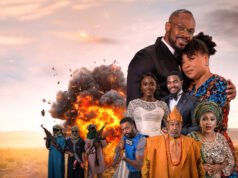After a chance meeting with an old friend, Efemini, who is dirt poor, is forced by circumstance to pursue a life of cybercrime in this new Netflix series, To Kill A Monkey.
Is this series worth all the hype? Well, let me tell you my honest opinion.
What worked?
Amazing performances!
It was such a pleasure to watch the actors in this series do their thing. Williams Benson gave a moving performance as Efe. Especially in the first two episodes, the anguish in his eyes was so believable. His portrayal was raw, layered, and sooo compelling.
Lilian Afegbai, who plays the role of Idia, comfortably delivers the best performance of her entire career in this series. She owned the role and truly became Idia. It was refreshing to watch. Bimbo Akintola also delivered a solid performance as Inspector Ogunlesi. She portrayed MO’s grief and mental health struggles with such ease and even though I did not quite like her character, I appreciated Bimbo Akintola’s delivery.
Special accolades to Bucci Franklin. He gives such a nuanced and powerhouse performance as Oboz that it creates the illusion the series itself is better than it actually is. He carries To Kill a Monkey so convincingly, it’s almost enough to blind you to its many flaws. I’ve always recognized and appreciated his skill as an actor. Whether he stars in a bad movie or a good one, his talent never fades into the background. I think he is a really good actor, and his delivery in this series is the main reason so many people walked away thinking To Kill A Monkey was a great show. I’m thankful to Kemi Adetiba for giving him a role that allows him to shine so brightly, like the star that he is.
I also thought the production quality was decent. The set design, visuals, and camera work all worked to a large extent and contributed positively to the overall viewing experience.
To Kill A Monkey – Themes
I liked the fact that the story touches on themes of friendship, morality, loss and grief, mental health struggles, the thin line between right and wrong, as well as the dehumanizing effects of poverty, to mention a few. Watching this, you could truly feel Efe’s plight. I’m sure many people must have muttered “poverty is a bastard” while watching, because indeed, it is.
Even though this is one of the issues I had with the series, I appreciated the fact that it attempted to shed light on cybercrime — especially because it comes at a time when cybercrime is a national pain point, and Nigerians around the world are being negatively profiled because of it.
There were several emotionally charged moments in the series, but the one that stayed with me was the scene where Oboz told Efe to get behind him, not knowing Efe had actually set him up.
What were the issues?
Unfortunately, there were too many issues with this series that affected how I felt both during and after it ended. It took me two days to complete, and I found it to be a tedious experience because so many things just didn’t make sense.
The first issue I had with the series was that in a story about a brilliant but poor man forced into a life of cybercrime, I was expecting a high-stakes cybercrime plot filled with clever schemes, strategic manipulation, and displays of mental acuity (just as Efe said). I don’t know about you, but I enjoy it when a series is rooted in a specific subject and shows clear knowledge of that world. I expected a deeper dive into the mechanics of cybercrime, I wanted technical lingo, believable scam operations, smart hacks, and glimpses into the real world effects of these crimes.
Instead, what we got what looked like another variation of King of Boys, filled with gang attacks, retaliations, counterattacks. Featuring a bald-headed, flesh-eating godfather who appeared out of nowhere and suddenly changed the entire direction of the story. I found myself asking, “From where to where?”
What should have been a gripping psychological war between a cybercrime syndicate and law enforcement turned into a chaotic, sometimes absurd series of events that lacked any real substance.
I did not like the way the plot progressed. I thought there were too many unnecessary scenes, they were just dragging things. Still, this series did more telling than showing. Every important information, every detail that should have and could have made the series thrilling, exciting, more coherent and engaging were “told” not “shown”. Even when it seemed ridiculous, they told us to take their word for it.
Instead of watching Efe and Amanda’s intimate dinner (it was over seven minutes long) where they discussed the most irrelevant stuff or watching Onome tell us he wet his bed until he was 21, I would have liked to see a montage or something showing how Oboz and Efe’s relationship and business evolved. How they moved from people who randomly reconnected to being brothers, the progress from using jazz to pull clients to international fraud. Unfortunately, the first time we saw them again after 4years, Oboz had a bag over Efe’s head and tried to kill him just because someone said he cheated, so it was difficult for me to buy the whole “brotherly” stuff they had going on.
For the NCCC office, I would have liked to see some of their operations, all through this series, we just saw them sitting around like they were working at a Jumia call center staring at random laptop screens pretending to be working on their laptops. They wanted us to believe that Inspector Ogunlesi was actually a brilliant investigator, one of the best the agency had but nowhere in this series did she display any hint of this intelligence.
They talked about the Monkey case, these brilliant fraudsters moving in a way the agency had never seen before but they showed us nothing! Efe and Oboz? We never saw them carrying out any of their Monkey Gang activities. it was like they stopped working. The task force in charge of the Monkey case? They did nothing. This would have been an opportunity to highlight some of the tactics used by the good guys to track and stop cyber criminals. These elements would have made the series not only thrilling but also credible, helping us understand the scope of modern-day fraud and the intelligence needed to stop it.
While it is very okay for a filmmaker to have a style, genre, or signature structure, it becomes problematic when that style is forced into stories that do not require it. Many may not agree, but I want to say categorically that the level of violence and bloodshed in this series was unnecessary. We did not need a godfather figure, and we definitely did not need fraudsters—who should have been engaged in digital warfare—shooting guns like street thugs while the core of the story was relegated to the background.
To make matters worse, even the violence wasn’t executed well. For example, what was that explosion scene??
Less than 24hours after Oboz was attacked, his men acquired a bomb, gained access to Teacher’s (Chidi Mokeme) compound and his personal car to plant a bomb that was set off not by a remote control or a timer but by starting the ignition. It is well. As for the explosion itself, too poor. A car exploded in such an enclosed area, yet nothing else was destroyed. The car remained whole. People standing a few feet away were untouched. Even the single body part that they wanted us to believe flew out of the burning car (the granddaughter’s hand), did you see it? Just casually lying down on the floor hours after the incident, unburnt, untouched, perfectly posed, with just the right amount of blood seeping out of the severed bone, and the beaded bracelet around the wrist looked as good as new……Haba?!!
Sani was murdered yes? Even till the end, they did not show us how his killers went in and out of the police station undetected. Then there was Teacher keeping body parts in his house and having his chef cook them. For what? He is supposed to be an old-school or traditional fraudster, not a body parts dealer, not a kidnapper, not a terrorist, not a ritualist so why exactly was that necessary??? What was the meaning of the head they put in the child’s bag? Whose head was it? I would have liked to see how they carried it into a school compound, entered the tiny classroom and dropped it inside a child’s bag without being noticed.
Flogging that old man with a sharp object, then pouring salt on his wounds, just to get him to reveal his son’s location? That scene did nothing for me. Old people fall for online scams all the time, they could have used other means to get access to him and get the information. In the case of the therapist, they could have compromised the login credentials of her computer, forged the letter and her signature, instead of sending a gunman to threaten her. These or a similar approach would have been more natural for fraudsters and it would have shown a deeper understanding of the theme too. But NOP! In a bid to make a splash, to shock us, Kemi Adetiba prioritized sensational violence over storytelling, throwing logic, coherence, and genre-appropriateness out the window.
While I genuinely enjoyed watching Oboz and Idia, another major issue I had with this series was that it was nearly impossible to root for any of the characters. The decisions they made were so consistently ridiculous that I just couldn’t care about them.
Poor character development
Efe: We pitied him at first, and we even understood his dilemma and internal conflict. But at the end of the day, he was a slow man. The same Efe who let Madam Adunni sleep with him without securing his payment first, who took a suspicious keke ride late at night when all the signs screamed “trap,” was the same mumu who failed to encrypt his files, allowing Amanda to easily access a video that he knew could ruin his life. Why was he meeting Onome inside the Jet of all places when he should’ve been fleeing quietly? Why did he even tell Amanda he was running away when he never planned to take her with him? No foresight, no sense.
Teacher: A problematic character that dragged the entire series down. His appearance, his actions, even his death, none of it appealed to me. They could’ve used him to highlight the contrast between old-school schemes and modern, AI-powered scams, but instead, they made him a thug with that his ugly ugly ugly ugly bald cap. Every time he appeared on screen, he annoyed me.
Ivie: I couldn’t make sense of her character. They somehow wanted us to believe she truly loved Oboz, even after he abandoned her and rejected the pregnancy. Why? Why was she mad at her father? Maybe if we had seen their relationship unfold in a way that felt sincere, her loyalty would have made sense.
Nosa: The absolute worst. I have nothing else to add.
So how do you like a series where you’re not invested in any character’s journey or fate? Where their wins and their losses mean absolutely nothing to you?
Unanswered questions
Moving on, there were just too many unanswered questions and unresolved issues that left me frustrated and confused.
Let’s start with Grandma’s death. Who was that child? Maybe I missed something because, who gives a random girl a knife to stab someone in broad daylight? One moment the child is standing by a shop, the next, she’s stabbing someone and walking away with the confidence of a trained assassin. No one saw her, no one stopped her.
Sani Bello’s storyline was riddled with flaws. He followed someone from midday until late night and the guy never noticed? Not even once? Seemed too easy to me considering the fact that he knew the kind of place he was going plus Sani was not even trying so hard to hide or anything. Still on Sani’s issue, let’s talk about his death. One minute Inspector Ogunlesi is the suspect, the next thing we know, there was the convenient “reflection” that proved that when Ogunlesi left him, he was still alive. How? What glass/mirror did this reflection come from? Where did the footage come from? Are we to believe that there was a camera inside that police station or in his dark cell? If so, how did it not capture the actual killers entering or leaving?
Moving on, as the series progressed, I realized the opening scene served no real purpose. It was all for shock value, nothing more. Remove it from the story and literally nothing changes. So if the beginning was unnecessary, the middle dragged, it didn’t come as a surprise to me that the end was disappointing.
We ended To Kill A Monkey with Efe’s Story Time and a courtroom scene that was incredibly underwhelming.
Listen, I know some people confuse excessive violence with brilliance but brilliance in storytelling to me lies in being able to adapt your style to fit the story you’re telling. In To Kill a Monkey, Kemi Adetiba kept on dragging her usual cinematic tropes into a new narrative that demanded a completely different approach.
Overall, To kill a monkey was not a good watch for ME. This thriller was poorly thought out and misguided, saying nothing new or insightful about the subjects it addresses. To Kill A Monkey will impress viewers who find the least bit of intrigue enticing, but it will disappoint those who crave logic, depth, and layered storytelling. Despite some strong performances and decent production value, the core of this series lacks substance, coherence, and true narrative finesse.
Rating: 4.5/10
Have you seen To Kill A Monkey? Do you agree with this review? Share your feedback in the comments section below.
Read review of Brotherhood here.
We have a fun and vibrant community on Instagram and Twitter, you can also join the conversation there!



















